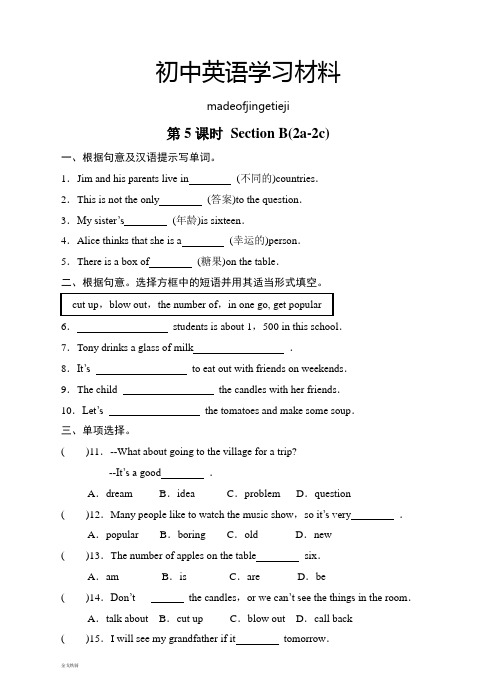七下Unit5-sectionB2a-2c
人教版七年级英语下册Unit5_SectionB_语境法讲解单词

亲切的
②Your computer is much friendlier than mine.
好用的
熟词生义
shy /ʃaɪ/ adj. 羞怯的,腼腆的
比较记忆 小明很害羞(shy),低头说(say) :“我喜欢她。”
例句 She is a shy girl. 她是一个害羞的女孩。
例句 His life could be in danger. 他的生命可能会有危险。
词形、词块拓展
danger 词形变化 (1) ___d_a_n__g_er_o_u_s________ 形容词(危险的) ① __m_o_r_e__d_a_n_g_e_ro_u__s____ 比较级 ② __th__e_m__o_st__d_a_n_g_e_ro_u__s_ 最高级 (2) ___e_n_d_a_n__g_er_e_d_______ 形容词(濒危的)
保存
③I’ve been saving stamps for years.
收藏
熟词生义
词形、词块拓展
save (1) _s_a_v_i_n_g_____________ 名词(节约;挽救;存款) (2) _s_a_v_e__o_n_e_'s_l_i_fe_______ 救某人的命 (3) _s_a_v_e_o_n__e'_s_l_if_e_______ 存一些钱 (4) _s_a_v_e__ti_m_e___________ 节约时间 (5) _s_a_v_e__w_a_t_e_r_________ 节约用水 (6) _s_a_v_e_e_n_e_r_g_y_________ 节约能源 (7) _s_a_v_e_t_h_e_e_n_v_i_r_o_n_m__en__t 拯救环境
仁爱版英语七年级下册Unit5_Topic2_SectionC_精品教案

Unit5 Topic2 SectionC 精品教案I. Material analysis本节课是第五单元话题二的第三课时,主要活动是1a、2a和3。
通过阅读描述校园内三个地方正在进行的活动呈现新单词以及匹配、改写句子、现场调查等笔头和口头的活动,复习巩固本话题的语法——现在进行时。
语音部分通过拼读单词音标,并根据字母组合发音规律拼写单词,复习巩固Section A所学音标,训练学生的拼读和拼写能力。
还将通过吟唱小诗,了解句子中单词的连续规则。
本节课的现在进行时涉及到特殊疑问句、一般疑问句以及其肯定和否定回答,教师应该在特定的语境中引导学生大量练习并予以巩固。
II. Teaching aims1.Knowledge aims能根据已学语音、音标及发音规则,正确朗读下列词汇并知其大意,能够准确拼写:around, few, a few, game, sit, ping-pong, lesson, write, aha, blackboard, at the back of, draw, picture在Section A和Section B的语法基础上,能熟练地将“现在进行时”运用于各种人称的特殊疑问句、一般疑问句并进行肯定和否定回答;学生在Section A已学的语音基础上,能结合音标拼写单词,并能尝试结合发音规律拼读新单词。
2.Skill aims能听懂有关谈论正在进行的动作的简单对话或叙述;能根据图文就现在进行的动作等话题进行交流;能够在图片的帮助下读懂体现校园生活的文章,并按要求进行语言活动;能通过观察身边的人用现在进行时描述他们正在进行的活动。
3.Emotional aims能够在谈论校园中正在进行的丰富多彩的活动中,发现校园生活的乐趣,从而培养热爱校园生活、乐于参加学校各种活动的意识。
III. The key points and difficult points1.Key points能熟练地将“现在进行时”运用于各种人称的特殊疑问句、一般疑问句并进行肯定和否定回答。
七年级-人教版-英语-上册-[能力提升]Unit-5-Section-B-(2a-2c)
![七年级-人教版-英语-上册-[能力提升]Unit-5-Section-B-(2a-2c)](https://img.taocdn.com/s3/m/6def5bdd1b37f111f18583d049649b6648d709b6.png)
Unit 5 Do you have a soccer ball? (Period 4)Section B (2a-2c)Ⅰ.完形填空。
The boy’s name is David. He ____1____ two friends ____2____ school. They are Jenny and Paul. They three are good ____3____. They all like to ____4____ sports.Jenny likes tennis very much. She thinks it is ____5____. She often plays tennis ____6____ the two boys after school. And she can play it very well.Basketball is Paul’s favorite ____7____. He thinks it is fun. He ____8____ like playing tennis and he thinks it is boring.David likes playing tennis ____9____ basketball. He plays ____10____ every day. They are relaxing for him.1.A.have B.has C.am D.are 2.A.at B.on C.from D.to 3.A.friends B.cousins C.boys D.girls 4.A.have B.ask C.find D.play 5.A.interesting B.boring C.happy D.difficult 6.A.for B.about C.with D.to 7.A.sport B.book C.pencil D.eraser 8.A.don’t B.doesn’t C.isn’t D.can’t 9.A.so B.or C.and D.but 10.A.them B.they C.it D.theirⅠ.阅读下面短文,并借助上下文补充所缺信息。
人教版英语七年级下册课时练 Unit 2 第四课时 Section B(2a-2c)

人教版英语七年级下册课时练 Unit 2第四课时Section B (2a-2c)Ⅰ. 根据句意及汉语提示完成单词1. The fish tastes(品尝) very good. Enjoy it, please.2. Mary sometimes(有时) goes to the park with her parents.3. The old doctor saves many people's lives(生命) every year.4. Bill always eats breakfast quickly(很快地) because he doesn't want to be late for school.5. You can either(要么) eat now or after the show.Ⅱ. 用括号内所给单词的适当形式填空1. He usually eats lots(lot) of fruit and vegetables, because they're good for his health.2. The little girl usually cleans(clean) her room on Sundays.3. I always brush my teeth first(one) after I get up in the morning.4. I like eating ice-cream. I know it's not good for my health, but it really tastes good(well).5. Mary usually does her(she) homework at 7 p.m.Ⅲ. 单项选择(C) 1. We usually play basketball ________ an hour after school.A. atB. inC. forD. on(D) 2. For breakfast, I usually have milk and eggs, but________ I eat noodles.A. alwaysB. oftenC. neverD. sometimes(D) 3. Lingling likes apples because they________ good.A. getB. lookC. soundD. taste(C) 4. —What do you usually do in the evening?—Well, I either watch TV ________ play games with my sister.A. andB. butC. orD. so(C) 5. He usually gets up ________ half past six ________ the morning.A. at; atB. in; inC. at; inD. in; atⅣ. 根据汉语意思完成句子,每空一词1. 你可以今天或明天来。
人教版七年级下册英语试卷unit1第5课时sectionb(2a-2c)(含答案)

初中英语学习材料madeofjingetieji第5课时Section B(2a-2c)一、根据句意及汉语提示写单词。
1.Jim and his parents live in (不同的)countries.2.This is not the only (答案)to the question.3.My sister’s(年龄)is sixteen.4.Alice thinks that she is a (幸运的)person.5.There is a box of (糖果)on the table.二、根据句意。
选择方框中的短语并用其适当形式填空。
cut up,blow out,the number of,in one go, get popular6.students is about 1,500 in this school.7.Tony drinks a glass of milk .8.It’s to eat out with friends on weekends.9.The child the candles with her friends.10.Let’s the tomatoes and make some soup.三、单项选择。
( )11.--What about going to the village for a trip?--It’s a good .A.dream B.idea C.problem D.question( )12.Many people like to watch the music show,so it’s very.A.popular B.boring C.old D.new( )13.The number of apples on the table six.A.am B.is C.are D.be( )14.Don’t the candles,or we can’t see the things in the room.A.talk about B.cut up C.blow out D.call back( )15.I will see my grandfather if it tomorrow.A.rains B.doesn’t rain C.will rain D.won’t rain四、根据汉语意思完成下列句子翻译。
2023【人教版】七年级英语下册教学课件-第4课时(B 2a-2c) (6)

➢ Ability aims:
1.To use proper reading skills to understand the passage. 2.To talk about family and school rules with friends.
➢ Emotion aims:
1.To know school and family rules in different countries. 2.To find proper ways to relieve worries and anxieties.
Traffic Rules
You can walk.
You can’t walk.
You can go straight or turn left.
You can’t go straight and turn right.
You can turn left. You can turn right. You can go straight.
My dad says I can’t play basketball after school because I must do my homework. I can play only on weekends. After dinner, I can’t relax either. I must read a book before I can watch TV. But I have to go to bed before 10:00. Rules, rules, rules! It’s terrible! What can I do, Dr. Know? Molly Brown, New York
人教版英语七年级下册Unit 2 Section B 2a-2c 课件
go to bed early__ √ eat ice-cream __
eat quickly __
play sports __√ eat vegetables __ √ take a walk __ √
Circle the healthy activities
2b 判断正(T)误(F)
( F)1.Tony likes to get up early. ( T)2.Tony goes to school at half past eight. ( F)3.Mary usually gets up at six. ( F)4.Mary never eats ice-cream after dinner. ( F)5.Tony and Mary go to bed at 10:00.
3. A: When does Jim do__(h_i_s_)_h_o_m__e_w_o_r_k?
B: He usuallyd_o_es__ his h__o_m_e_w__o_rk_ at __ _a__q_u_a_rt_e_retioght in the __e_v_e_n_in_g.
4. A: When does Eric _t_a_k_e_a w__a_lk_?
2. I either watch TV or play computer games.
Revision
Ask and answer.
A: Can you say the time in the three ways? B: Yes/No. A: What time is it? B: It’s ...
学习目标
重点单词: quickly, either, lot, sometimes, taste. 重点短语: either…or…,be good for, lots of. 重点句式: 1.I don’t have much time for breakfast, so I usually eat very quickly.
七年级下册人教版英语七下Unit 2 Section B(2a-2c)(共28张PPT)
Mary is my sister. She usually gets up at six thirty. Then she always takes a shower and eats a good breakfast. After that, she goes to school at eight thirty. At twelve, she eats lots of fruit and vegetables for lunch. After lunch, she sometimes plays volleyball. She always eats ice-cream after dinner. She knows it’s not good for her, but it tastes good! In the evening, she does her homework and usually swims or takes a walk. At nine thirty, she goes to bed.
当either…or…连接两个名词作主语时,谓语动词的时态和数应与最近的一个相 匹配。
Either you or he is right. 不是你对就是他对。 Either he or you are right. 不是他对就是你对。
either…or和or的区别和用法
来看两个例子:
She will come either today or tomorrow. 她不是今天来就是明天来。
1) be good for …表示“对……有益;对……有好处”; be bad for…表示“对……有害;对……有坏处”。
It’s good for our health to go to bed early and get up early. 早睡早起对我们的健康有好处。 Smoking is bad for your health. (吸烟无益健康。)
Unit 2 Section B 2a-2c 教案 2024-2025学年人教版英语七年级下册
课题人教版七年级下册Unit 2 No rules no order Section B 2a-2c 英文教案课型新授课主备人一、Teaching Objectives1. Language skillsStudents will be able to understand and use the modal verbs "can", "have to / must", and "can't / mustn't" correctly in written and oral English.Students will be able to write a letter giving advice on rules.2. Language knowledgeStudents will master the key vocabulary and phrases related to rules, such as "clean the room", "get untidy", "wear one's own clothes", "practise the violin".3. Cultural awarenessStudents will understand the importance of rules in different cultures and societies.4. Learning strategiesStudents will develop their reading and writing strategies, such as skimming, scanning, and organizing ideas.5. Emotional attitude and valuesStudents will realize the significance of following reasonable rules and learn to express their feelings and needs appropriately.二、Teaching Key and Difficult Points1. Teaching key pointsThe correct usage of modal verbs "can", "have to / must", and "can't / mustn't" in different contexts.Understanding the main idea and details of the reading passage.Writing a reply letter with appropriate advice.2. Teaching difficult pointsDistinguishing the subtle differences in meaning and usage among the modal verbs.Expressing personal opinions and giving reasonable advice on rules.三、Teaching Methods1. Task-based teaching method: Design various tasks to guide students to complete the reading and writing activities.2. Communicative teaching method: Encourage students to communicate and discuss in pairs or groups to enhance their language output.3. Situational teaching method: Create real-life situations to help students understand the application of rules and modal verbs.四、Teaching ProceduresStep 1: Warming-up (5 minutes)1. Greet the students and have a free talk about rules.Ask students: Do you have any rules at home or at school? What are they?Invite several students to share their answers and lead into the topic of today's lesson.Step 2: Pre-reading (5 minutes)1. Present the title "No Rules, No Order" and ask students to predict what the passage might be about.2. Show some pictures related to rules at home and at school and ask students to describe them using the words and phrases they know.Step 3: While-reading (15 minutes)1. Fast readingAsk students to read the letter in 2a quickly and find out the main problem of Eric.After reading, invite a student to summarize the main idea.2. Careful readingAsk students to read the letter again carefully and complete the blanks with the correct modal verbs "can", "have to / must", or "can't / mustn't".Check the answers together and explain the usage of each modal verb in the context.Ask students to underline the rules mentioned in the letter and discuss in pairs why these rules might be important.Step 4: Post-reading (10 minutes)1. Group discussionChoose three important rules from 2a and ask students to discuss the questions in 2b with a partner.After the discussion, invite several groups to share their opinions and advice.2. Writing practiceAsk students to write a reply to Eric as Dr. Know, giving him some advice. Remind them to use the modal verbs correctly and organize their ideas logically.Provide some useful expressions and sentence structures on the blackboard to help students.Step 5: Presentation and Feedback (5 minutes)1. Invite some students to read their replies aloud and display them on the screen.2. Encourage other students to give comments and suggestions.3. Provide positive feedback and correction for the students' writings.Step 6: Summary and Homework (5 minutes)1. Summarize the key points of this lesson, including the usage of modal verbs and the importance of rules.2. Assign homework: Ask students to rewrite their reply letters after class and share them with their parents or friends.。
2023【人教版】七年级英语下册教学课件-第4课时(B 2a-2c) (2)
there. When I read books, time goes quickly! You can get to th到e地l达ib点r,a的r后y名接e词a表si。l示y. Just go down North
Road and turn left. It is across from the park.
e.g: 1) Where does John like to go? 2) How does he get there from his home? …
e.g: 1) Where does Lisa like to go? 2) How does she get there from her home? …
I live in a 住no在isy…n…eighbeonrjhoyooodne. sTelhf e玩re得is愉a快post office
between my house and=ahcalvoethaegsosotdo/grree.aBt utimt me y favorite
place is the library. It is very quiet and I enjoy reading
2 Read the second passage and judge.
1. John lives near a supermarket.
T
2. John always exercises at the park.
F
3.
John thinks the clean air and sunshine are the best things in life and they’re free.
and sunshine. The best things in life are free!
